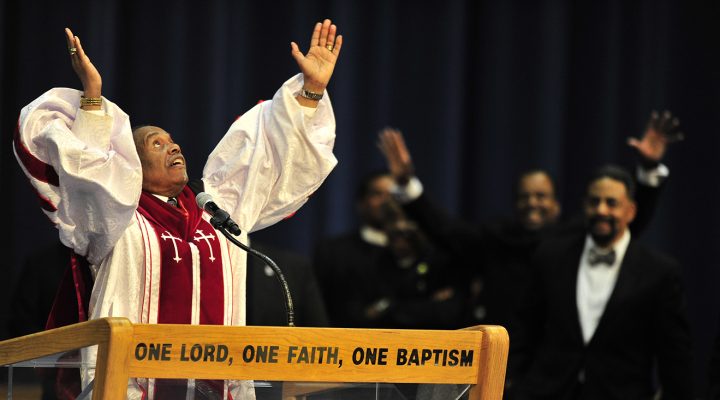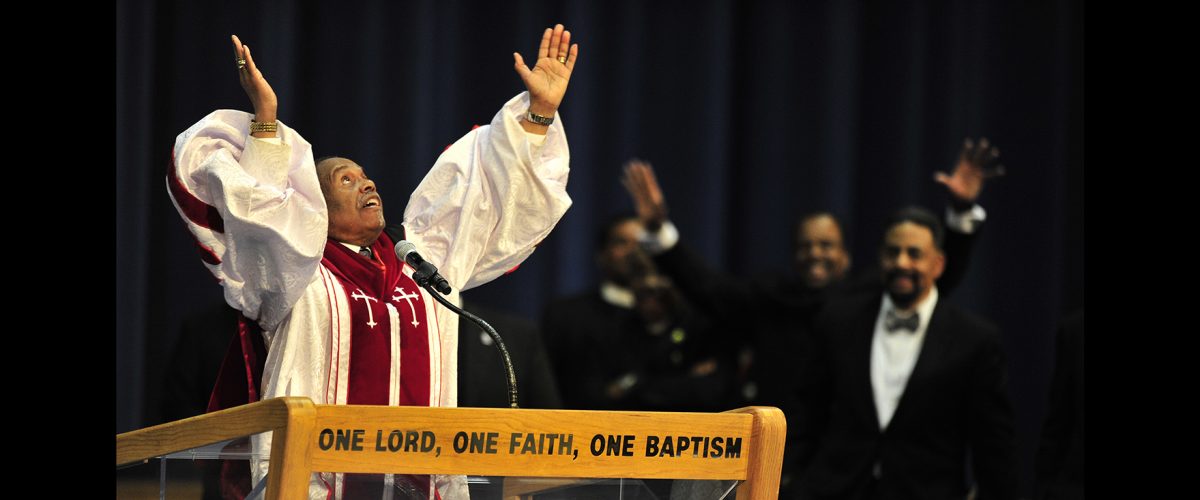Charles G. Adams, retired pastor of Detroit’s influential Hartford Memorial Baptist Church, died Nov. 29 at age 86. He was a respected leader not only in Detroit but nationally, including longtime service on the board of Baptist Joint Committee for Religious Liberty.
“The world lost a prophetic and powerful witness with the passing of the Rev. Dr. Charles G. Adams. Not only was he one of the nation’s most prominent ministers, but he was a longtime member of the BJC board of directors,” said BJC Executive Director Amanda Tyler. “We celebrate his contributions to our shared work and his many more contributions to the life of our nation.
“His advocacy for social justice and religious freedom throughout his decades of dedicated service continue to ring true,” she added. “Adams shared how the church is called to be God’s instrument of hope, and he was part of that hope during his time ministering to this world. His wisdom and leadership made this world a better place.”
Adams graduated with honors from the University of Michigan and Harvard University and went on to become a doctoral fellow at Union Theological Seminary in New York City. From 1962 to 1969, he served as pastor of Concord Baptist Church in Boston, followed by an appointment as pastor of Hartford Memorial Baptist Church in Detroit — a post he held for 50 years.
In 2019, he was succeeded by his son, Charles C. Adams.

Charles G. Adams (left) with his son and successor, Charles C. Adams. (Screenshot)
The elder Adams became known as “the Harvard Hooper” for his Ivy League intellect and animated preaching style. He became well known across Detroit not only for his preaching but also for his social advocacy and ministry creativity.
He worked as an aide to Martin Luther King Jr., was a vocal opponent of South African apartheid and led an economic boycott of Dearborn, Mich., when the city closed its parks to nonresidents. Locally, he was known for using the church’s resources to foster economic development.
Detroit Mayor Mike Duggan called him “a tireless fighter for the people of Detroit.”
Among his community service innovations, Adams led the church to open Hartford Village, a gated community for senior citizens. Over time, he acquired land around the church property and used it for similar economic development projects.
At Harvard, Adams studied under Paul Tillich, Amos Wilder and Reinhold Niebuhr. At one point, Adams returned to Harvard as a tenured professor at Harvard Divinity School, where he became the inaugural Nickerson Professor of the Practice of Ethics and Ministry. He commuted back and forth between Boston and Detroit to fulfill both roles as professor and pastor.
“God needs no help from government to remain God.”
Among his affiliations, Adams played active roles with the Baptist World Alliance, the World Council of Churches, the National Council of Churches, the Congress of National Black Churches, Morehouse College and Morris College.
Amid his long tenure on the BJC board, he served as chairman of the board from 1976 to 1978 and board secretary from 1989 to 1991.
“God needs no help from government to remain God,” he said while delivering the 2008 Walter B. and Kay W. Shurden Lectures on Religious Liberty and the Separation of Church and State.
Adams also foresaw the conservative trend currently polarizing America — as early as 1976.
“America has never lived up to the principle of human equality declared in and by her birth,” he said that year in an address discussing the need for equal educational opportunity and affirmative action.
“Had the Founding Fathers been literally truthful concerning their actual beliefs and practices,” he said, “they would have said, ‘All men are created equal with the following exceptions: slaves, Negroes, Catholics, Asians, atheists, women, Jews, non-proprietors, Indians, heretics, etc.’”
He continued: “Even Thomas Jefferson owned slaves who had no guarantee or protection of life, no liberty and were restrained from any protracted pursuit of happiness.”
Then he noted public opinion in America was swinging “toward the right in fear and reaction” to advances of minorities and cultural diversity. Citing champions of human rights, he asked, “Are there any current replacements for John F. Kennedy, Lyndon B. Johnson, Martin Luther King Jr. or … William O. Douglas?”


